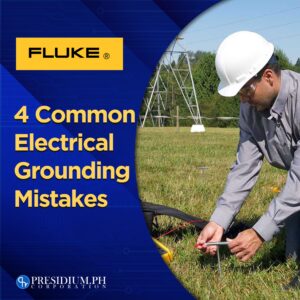Fluke Insulation Testers: How To Choose The Best One That Fits Your Needs

It’s a handy thing to have Fluke insulation testers at the back pocket of every maintenance or troubleshooting professional. However, are you sure that it’s the right insulation tester to get the job done? Insulation testers are known to be a popular tool for machinery that prevents faults from occurring. It has the advanced capability of detecting machine imperfections ahead of time and this, ultimately, makes it an ideal tool for your voltage and current measurement needs.
Importance of insulation testing.
Are you familiar with pipe leaks? Or how about a balloon with a needle puncture? The bottom line is, both of these minor malfunctions have one thing in common. With pipe leaks, a bit of water will be dripping out (depending on how big the puncture is). On the other hand, with the punctured balloon, the small puncture will cause it to deflate little by little and lose its overall capacity to be in good working condition.
Basically, this is also what happens to wires. Although from the outside, a wire seems well protected, one shouldn’t be too sure. Wires contain currents. And at times, these currents don’t always flow perfectly. Sometimes, steady flows of energy can stray away from a perfect line.
Which leads us to the next question, how do we detect these malfunctions caused by the current? This is where insulation testers come into the picture.
Types of currents to watch out for.
Knowing the type of energy that flows into the wires you’re testing for also proves significance. Here, you’ll get to know three kinds of currents which are capacitive currents, absorption current, and leakage current. Let’s get to know each one up close.
- Capacitive currents – It is the process of collecting and storing energy from an electrical charge. Capacitors come in many forms. Energy storing devices are one of their popular reputations.
- Absorption current – Absorption current takes place when voltage builds up. Ultimately, when voltage goes to an all-time high, the insulation decreases. In return, this will create a gradual change that will reflect its storage of potential energy along with the insulation.
- Leakage current – A number one case scenario of deteriorating insulation is a leakage in the currents. Additionally, this is also a result of a decrease in resistance.
Significant uses of Fluke Insulation Testers.
Insulation testers are particularly important to be used when new electrical machinery is being installed. This is to make certain that insulations are in good shape. Take note that testing should come before the installation. Using insulation testers before any operation is for the good of the machines and for the safety of personnel.
Furthermore, one of the most notable features of Fluke insulation testers is that they can download data for future reference testing. This is advantageous for maintenance professionals since this kind of feature saves time and saves us the hassle to keep documentation from every testing.
Choosing the best Insulation Testers.
Although insulation testers have one goal, we must keep in mind that each has its own specialty. Luckily, Fluke products have the best selection of Insulation Testers that are set to meet your needs. Take note of its prime features that you think will best get the job done.
- Fluke 1577 Insulation Multimeters
Insulation testers and multimeters combined as one? Now that’s one powerful tool. This Fluke insulation tester can provide maximum versatility for both troubleshooting and preventive maintenance. If you’re troubleshooting motor systems, electrical distribution, and production equipment, then this tool is the best one for the job.
Notable features:
- Large display with backlight.
- Insulation test (1587: 0.01 MΩ to 2 GΩ) (1577: 0.1 MΩ to 600 MΩ).
- Insulation test voltages (1587: 50 V, 100 V, 250 V, 500 V,1000 V),(1577: 500 V, 1000 V) for many applications.
- Live circuit detection prevents insulation tests if voltage > 30 V is detected for added user protection.
- Auto-discharge of capacitive voltage for added user protection.
- AC/DC voltage, DC milliVolts, AC/DC milliamps, Resistance (Ω), Continuity.
- Filter for motor drive measurements (1587 only).
- Magnetic hanging system to free your hands for other work
- Fluke 1507 Insulation Resistance Testers
A tool is good to work in advanced industrial and electrical insulation testing. The Fluke 1507 Insulation Resistance tester has the capability to hold multiple test voltages that make it ideal for troubleshooting, commissioning, and preventive maintenance uses.
This handheld super tool will make it easy for every maintenance professional to perform quick and advanced insulation resistance testing. Furthermore, it’s lightweight in built which makes it easy to pack and use. Additionally, it sports innovative features such as remote probes. This will allow you to make cost-efficient repetitive testing on your machines and electronics.
Other notable features:
- Performs insulation tests from 0.01 MΩ to 2.0 GΩ
- Includes live circuit detection to prevent insulation test if voltage >30 V is detected.
- Includes auto-discharge of capacitive voltage for added user protection.
- Measures AC/DC voltage from 0.1 V to 600 V and resistance from 0.01 Ω to 20.00 kΩ.
- Provides lo-ohms earth-bond continuity (200 mA)
- Simplifies repetitive or hard-to-reach testing with the remote test probe
- Accepts optional Fluke TPAK magnetic hanging system to free your hands for other work
- Comes with a remote probe, test leads, test probes, and alligator clips.
Now you have the best choices for insulation testing right in front of you. Get your Fluke Insulation Testers from an official distributor: https://presidium.ph/product-category/products/fluke-industrial-group-tools/insulation-testers/




